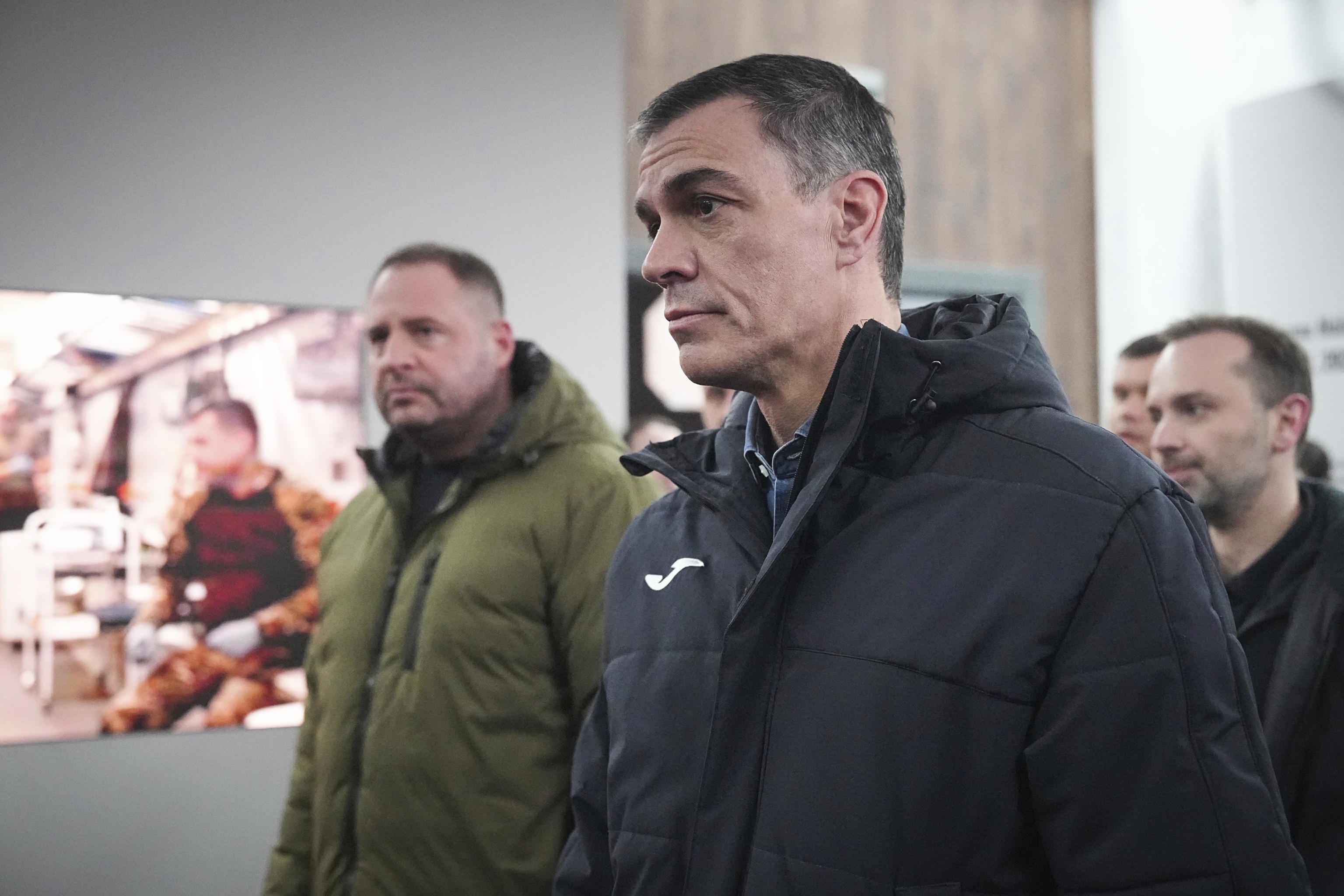After several nights of intense bombings on the Ukrainian capital, breaking previous records of drone attacks (267 unmanned aircraft last Saturday night), Pedro Sánchez wanted to show support to his ally, President Volodymyr Zelensky on the third anniversary of the Russian invasion. Upon arrival, the city experienced a missile and drone alert, something common in recent weeks. The absence of any member of the Trump Administration was notable.
Sánchez stated that "Ukraine must achieve a just and lasting peace. The freedom, security, and future of all Europeans depend on it." He announced that Spain will send "a new military aid package worth 1,000 million dollars to the Ukrainian people." "Diplomacy alone will not be enough. We need to combine it with more strength and unity," he concluded. Sánchez also requested that "Ukraine join the European Union as soon as possible." "Ukraine's accession to the European Union would be the most important victory for the Ukrainian people. Ukraine's hope lies in Europe, but Europe's hope also lies in Ukraine," he pointed out.
Other countries, such as Canada, also announced various military aid shipments, like Canada, which will donate 25 LAV III infantry fighting vehicles. Most of Ukraine's allies blatantly ignored the Trump-Putin agreement and presented their own initiatives separately. For example, the winner of the German legislative elections, conservative Friedrich Merz, insisted that Ukraine "must be part of the peace negotiations." "Europe stands firmly by Ukraine," he declared.
"Three years since the start of the large-scale Russian invasion. Three years of absolute heroism of our people. Eternal memory to all who defend our country and to those who have given their lives for Ukraine to live," stated Zelensky. The Ukrainian president also thanked "all free nations" for their support.
In addition to Sánchez, those who participated in the tribute to the fallen in Maidan Square in central Kiev included the President of the European Commission, Ursula von der Leyen; Canadian Prime Minister Justin Trudeau; and Danish Prime Minister Mette Frederiksen. These leaders are among the foreign leaders who traveled to Kiev on Monday to reaffirm their countries' support for Ukraine on the third anniversary of the war's beginning. "A just and lasting peace cannot be achieved without Ukrainians at the table," said Trudeau. Later, an International Summit in Support of Ukraine was held, with other leaders participating remotely. "Any agreement must be negotiated and accepted by Ukraine," said Czech President Petr Pavel.
The leaders of the European Union institutions called for maintaining "transatlantic and global solidarity with Ukraine" to achieve peace based on the formula proposed by Kiev on the war's third anniversary, amid controversy over talks between the United States and Russia to end the conflict. "In a difficult international and geopolitical environment, we emphasize the importance of maintaining transatlantic and global solidarity with Ukraine. We highlight the need to ensure that the international community remains focused on supporting Ukraine to achieve a broad, fair, and lasting peace based on Ukraine's peace formula," they said in a statement.
Special Tribunal for the Crime of Aggression
The President of the European Commission, Ursula von der Leyen, and the President of the European Council, Antonio Costa, present at the event, emphasized that "Russia and its leaders bear unique responsibility for this war and the atrocities committed against the Ukrainian population" and called for them to "be held accountable for all war crimes and crimes against humanity committed." In this regard, they welcomed the recent progress in establishing a Special Tribunal for the Crime of Aggression against Ukraine, demonstrating that Brussels is moving in a very different direction from Washington. As usual, European leaders traveled by train to the Ukrainian capital from Poland.
Meanwhile, Russian Foreign Minister Sergei Lavrov stated that Russia will only stop fighting in Ukraine when it has obtained what it wants from negotiations on ending the conflict that the Russian and American presidents want to initiate. "We will only cease hostilities when these negotiations lead to a firm and lasting result that suits the Russian Federation," he told the press during a trip to Ankara, Turkey.
Moscow demands the de facto surrender of the Ukrainian army, the cession by Kiev of five regions partially or fully occupied, the renunciation of joining NATO, and the creation of new authorities, something that neither the Kiev government nor the European Union seem to agree on.
Turkish President Recep Tayyip Erdogan also called on Monday via video conference at the international summit in support of Ukraine, held in Kiev on the third anniversary of the war, for both sides involved to be represented in any negotiation process. Erdogan demanded that "both sides be fairly represented" and reaffirmed his willingness to host any negotiation process to end the conflict. The Turkish president reiterated his "strong support" for Ukraine, a country he described as a "friend," and reiterated his commitment to Ukraine's "territorial integrity" and "sovereignty."
